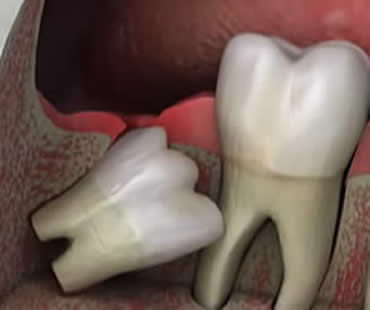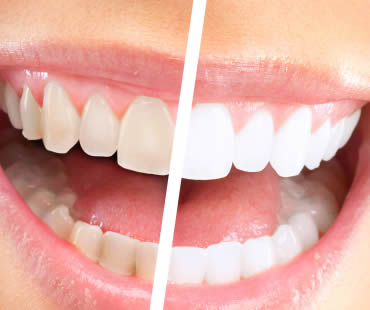
When a tooth is seriously decayed or has become infected, a root canal procedure can be done to repair the tooth and save it. During the procedure, the nerve and pulp are removed, while the remainder of the center of the tooth is thoroughly cleaned and then carefully sealed to prevent infection.
“Root canal” is the term for the natural space within the tooth’s center. The tooth’s nerve is in the root canal, as is the pulp (or pulp chamber), which is the soft area within the root canal. Because the tooth’s nerve isn’t vital to a tooth’s health, removing it doesn’t prevent the normal functioning of the tooth.
Removing the nerve and the pulp is necessary in some cases to address irritation, inflammation and infection stemming from severe decay, damaged or deep fillings, cracked or chipped teeth or facial trauma. When the nerve tissue and pulp become damaged, bacteria begin to form within the pulp chamber. This can lead to a serious infection or abscessed tooth. An abscess can form when the infection spreads past the ends of the tooth roots.
Additionally, severe infections can lead to bone loss around the tip of the root or holes in the tooth that drain the infection into the gums or through the cheek into the skin. It can cause swelling that spreads to the face, head, or neck.
Sometimes, the only signs you need a root canal procedure are more minor. They can include tooth pain when applying pressure or chewing, discoloration (darkening) of the tooth, tenderness and/or swelling of the gum tissue, or a pimple or blemish on the gums that is recurring. Acute sensitivity to cold or hot temperatures that does not abate with time can also be a sign.
Talk to your dentist or endodontist (a dentist whose specialty is the cause, diagnosis, prevention, and treatment of diseases and trauma to the dental pulp or nerve of the tooth) about your concerns. Your dentist will know what to do so you may make the best decisions for your long-term tooth health.
If you live in the Ottawa area and you need a root canal, contact our dental office today.

Broken, chipped, stained, or crooked teeth can ruin an otherwise nice smile. Minor flaws like these can be easily corrected with dental veneers. They are a popular way to whiten, straighten, and improve smiles to get long-lasting and natural-looking results. Here are some reasons that veneers are chosen by many people wanting to change their look.
Better smile
Veneers are thin porcelain shells customized to fit securely onto the front surfaces of your teeth. They hide problems and fit in beautifully with the rest of your features. Your smile will be made brand new.
No more stains
Yellow or stained teeth can really make a smile look unattractive. Some discolorations are very hard to get rid of, even with professional cleanings or whitening. Veneers instantly brighten your smile to the shade of your choice, and resist stains so that you no longer have to worry about the foods and drinks you consume.
Straighter teeth
If your teeth alignment problems aren’t major and you don’t want to go to the hassles or expense of braces, veneers may be a solution. They go right over crooked teeth to create a straight smile.
Quick results
Veneers can be provided in just a couple of office visits. You will have a short time between getting temporary and permanent veneers attached, but once they are in you’ll immediately have an improved smile.
Long lasting
Veneers can last a lifetime if you take proper care of them. Regular brushing, flossing, and checkups will help ensure a sparkling smile for many years to come.
Few risks
Side effects with veneers are nearly non-existent. There may be some initial discomfort, but it subsides quickly and can be treated with over-the-counter medications. The only thing to remember is that veneers are permanent. Since a small amount of tooth enamel is removed to accommodate the veneers, you’ll have them forever or will need to get replacements at some point.
Cosmetic dentist in Ottawa

Many people suffer from dental fear and anxiety to the point that they avoid even routine dental checkups and cleanings. Unfortunately, ignoring your oral healthcare can have dire consequences, affecting not only your dental health but your overall general health as well. If you are nervous and fearful of dental visits, you may be interested to learn about the benefits of sedation dentistry.
Sedation dentistry is a safe and commonly utilized option for dental patients to help them relax and undergo dental procedures without fear or apprehension. Your sedation dentist can offer a variety of sedation choices, and will likely suggest the option they feel best suits your needs.
Conscious sedation allows you to remain fully awake and able to respond to commands while enjoying a comfortable and relaxed state. Some of the options for conscious sedation include:
- Nitrous oxide, or “laughing gas”, leaves you feeling relaxed but responsive during dental procedures.
- Oral sedatives can be taken about an hour before dental treatment and provide their calming effects before and during your dental appointment.
- Intravenous sedation is administered through an IV and takes effect faster than oral medication. Your level of IV sedation is carefully monitored by your dentist and can be adjusted as needed.
Dental sedation allows you to undergo procedures as routine as a regular cleaning to more involved treatments like root canal therapy without anxiety and fear. You will remain awake but relaxed, and have little or no memory of your procedure. Consult with Ottawa sedation dentist Dr. Dzajkovski to find out more about how sedation dentistry can ease your fear of the dental chair and allow you to get the dental care you need.
We treat patients from Ottawa and the surrounding area

Also called third molars, wisdom teeth are the last set of teeth to erupt. Usually, people get their wisdom teeth in during their late teens and early 20s. Although some individuals have no trouble with their wisdom teeth, many people end up having these teeth removed because they may become impacted and create dental health issues. Learn more about wisdom teeth with this Q and A:
Do I need to have my wisdom teeth removed?
If your wisdom teeth aren’t causing problems, you can leave them alone. Typically, wisdom teeth are crooked or impacted, which can generate problems with the surrounding teeth. Also, wisdom teeth can be harder to keep clean, so the risk of decay on these teeth is higher.
When should I have these teeth taken out?
For optimal results, most dentists recommend wisdom teeth removal for patients when they are between 16 and 22 years old. The formation of the roots isn’t complete, so you have fewer complications.
Are there any risks?
As with any surgery, you can have issues arise, but the biggest concerns are nerve damage and dry sockets. Older patients have a greater chance of nerve damage because the root has more fully developed. Dry sockets occur when the post-surgery blood clots dislodge.
Does my age matter?
Some adults don’t experience any symptoms until they are in their 30s, 40s, or 50s. You can have these teeth extracted at any point, but when you get older, surgery is more difficult and the recovery takes longer. If you have trouble with your wisdom teeth, contact your dentist right away for a complete exam.
Ottawa dental office for wisdom teeth – PermaSmile!

Nobody is happy with yellow or brown teeth. Ugly stains from smoking or consuming foods and drinks prone to discoloring your teeth can make you a good candidate for teeth whitening. There are many techniques available to restore your bright smile. The main two categories of teeth whitening are either at-home kits or professional treatment in a dental office. Let’s learn about these to see which you’d like to use to brighten your smile.
At-home teeth whitening
There are a variety of products you can try yourself to whiten your teeth. These treatments usually take a few weeks of use before your teeth are noticeably whiter. Also remember that most of these products cannot achieve as high of a level of whiteness as those performed professionally.
- Kits – whitening kits contain a tooth mold and gel to place inside the mold. You wear the filled mold for about 30 minutes for 2-3 weeks.
- Strips – thin whitening strips are coated with peroxide gel, and then you apply the strips directly to your teeth for 30 minutes for 14 days. Results become evident in a few days and last about four months.
- Toothpaste – brushing with whitening toothpaste must be done consistently and you must be patient because reaching the desired outcome usually takes a couple of months.
Professional teeth whitening
Treatments done by a dentist are the fastest and most effective way to regain your pearly whites.
- Laser whitening – the dentist coats your teeth with a hydrogen peroxide solution and then shines a laser light on them. This oxidizes the stains and gives them a whiter appearance.
- Porcelain veneers – if your teeth are severely stained and other whitening techniques haven’t done the trick, your dentist may recommend porcelain veneers. These shells permanently cover your teeth and provide a beautiful smile.
Teeth Whitening dentist in Ottawa

For many years, your only choice for replacing missing teeth was dentures or bridges. Now dental implants offer an impressive alternative. Don’t rule them out just because you don’t know what they are, what the process is, who makes a good candidate, or what the benefits include. Learn more about implants so you can make an educated decision whether they’re right for you.
Teeth can be lost or severely damaged for many reasons such as gum disease, tooth decay, or injury. Dental implants provide a solution by surgically placing a titanium root directly into your jawbone. A post connects the implant to an artificial tooth that is placed on top during a second surgery. Usually there is a delay between the first and second surgeries to allow for proper healing so that the implant is successful.
Implants offer lots of benefits. They look and feel like your real teeth, and there’s no slipping or speech problems as with other restorations. They have a very high success rate and can last a lifetime with good care. Your oral hygiene tasks are the same as with real teeth. Your self-esteem will increase with your fully restored and functional smile.
Although many people are good candidates for implants, your dentist will let you know if there are risks for you. Healthy gums are very important, so those with periodontal disease may not be suitable. There also must be sufficient jaw bone support for implants to attach successfully, or you might be able to have bone grafting done to achieve more jaw strength before implants.
Dental implants are often the ideal solution for people who are missing teeth. Even though you might be nervous about the procedure, implants provide a great way to restore your smile comfortably and naturally.
Dental Implants Ottawa







